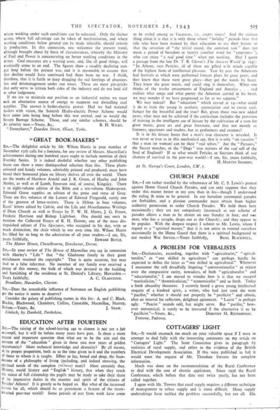EDUCATION AFTER FOURTEEN
SIR,—The raising of the school-leaving age to sixteen is not yet a fait accompli, but it will be before many years have past. Is there a more urgent and important question than what are to be the aim and the content of the " education " given in those two new years of golden Opportunity? More technical knowledge and dexterity? By all means, In its proper proportion, both as to the time given to it and the numbers of those to whom it is taught. Effort to lay, broad and deep, the foun- dations of a philosophy of living (including, and indeed stressing, the spiritual needs of the complete (riAeLos) man)? Most certainly that. History, world history and "English " history, that when they reach the status of full citizenship the pupils may be ready to take their share of its imperative duties in the manner and spirit of the citizens of Pericles' Athens? It is greatly to be hoped so. But what of the increased leisure for all, which should be so prominent a feature of the recon- structed post-war world? Some periods of rest from work have come to be styled among us Vacations, i.e., empty times! And the curious thing about it is that it is only those whose " holiday " periods bear that title who have been trained by their education to use their leisure so that the cessation of " the trivial round, the common task " does not mean a period of boredom or inanity (another word for " emptiness "), who can enjoy " a real good time " when not working. May I quote a passage from the late Dr. T. R. Glover's The Ancient- World (p. 124): " In Athens, says Pericles, all of them are gifted with minds capable of the highest form of intellectual pleasure. Year by year the Athenians had festivals at which were performed famous plays by great poets, and they knew that these were great plays—they got the words by heart. They knew the great music, and could sing it themselves. When one thinks of the trashy amusements of England and America . . . and realises what songs and what poetry the Athenian carried in his heart, we may wonder if we have progressed as far as we suppose."
We may indeed! But " education " which ceased at 14—what could it do to train the young in aesthetic appreciation and to create soul- hunger for the beautiful and the true? But, given those two new added years, what may not be achieved if the curriculum includes the provision of training in the intelligent use of leisure by the cultivation of a taste for great music, great art and great literature, and that not merely as listeners, spectators and readers, but as performers and creators?
It is in his leisure hours that a man's true character is revealed. It was never so true as in this mechanical age, that it is only " on vacation " that a man (or woman) can be their " real selves." Are the " Pictures," the Soccer matches, or the " Dogs " true mirrors of the real self of the Soul of England? If so what would Pericles or Socrates think of our chances of survival in the post-war world?—I am, Sir, yours faithfully, H. MARTYN SANDERS.
22 St. George's Court, London, S.W. 7.


























 Previous page
Previous page